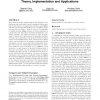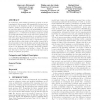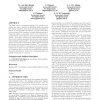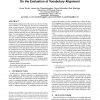135
click to vote
CCS
2011
ACM
14 years 1 months ago
2011
ACM
We present the design, implementation and evaluation of an algorithm that checks audit logs for compliance with privacy and security policies. The algorithm, which we name reduce,...
144
click to vote
ATAL
2011
Springer
14 years 2 months ago
2011
Springer
In modal logic, when adding a syntactic property to an axiomatisation, this property will semantically become true in all models, in all situations, under all circumstances. For i...
142
click to vote
ATAL
2011
Springer
14 years 2 months ago
2011
Springer
The main goal of a persuasion dialogue is to persuade, but agents may have a number of additional goals concerning the dialogue duration, how much and what information is shared o...
212
click to vote
KCAP
2011
ACM
14 years 4 months ago
2011
ACM
Gold standard mappings created by experts are at the core of alignment evaluation. At the same time, the process of manual evaluation is rarely discussed. While the practice of ha...
152
click to vote
KCAP
2011
ACM
14 years 4 months ago
2011
ACM
With billions of assertions and counting, the Web of Data represents the largest multi-contributor interlinked knowledge base that ever existed. We present a novel framework for a...
146
click to vote
DLOG
2011
14 years 5 months ago
2011
A combination of open and closed-world reasoning (usually called local closed world reasoning) is a desirable capability of knowledge representation formalisms for Semantic Web app...
115
click to vote
IJCAI
1989
15 years 3 months ago
1989
Over the last few years, object-oriented techniques have gained an increasing recognition both in software engineering and in AI. Object-oriented systems present undisputable adva...
124
click to vote
IJCAI
1997
15 years 3 months ago
1997
In the paper, we consider the problem of supporting automated reasoning in a large class of knowledge representation formalisms, including terminological and epistemic logics, who...
124
click to vote
DELOS
2000
15 years 3 months ago
2000
In this short paper, the basic ideas behind a project on the application of Knowledge Representation formalisms and technologies for Conceptual Modelling and Query Management are ...
112
click to vote
IJCAI
2003
15 years 3 months ago
2003
Compilability is a fundamental property of knowledge representation formalisms which captures how succinctly information can be expressed. Although many results concerning compila...




